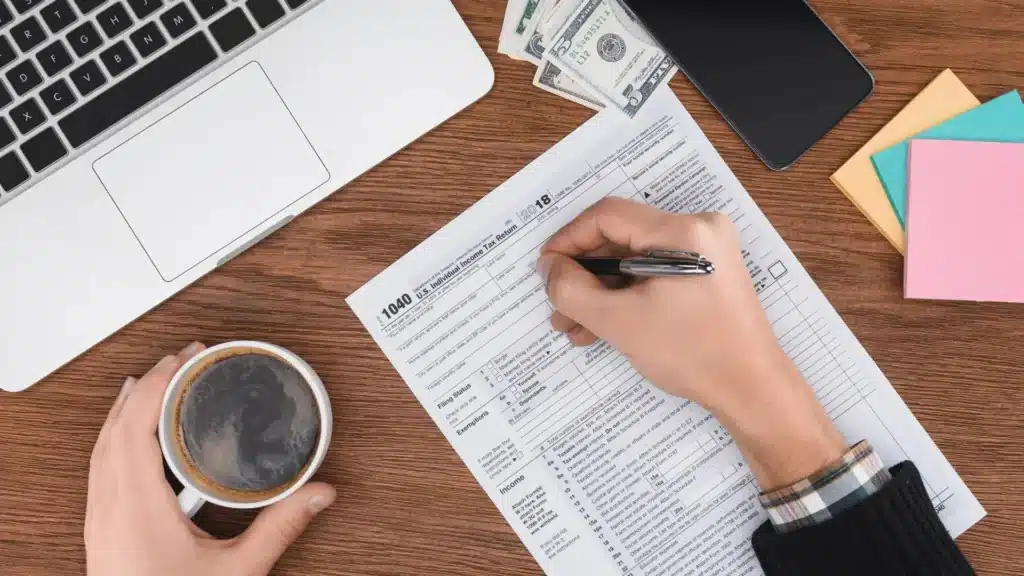Table of Contents
Ignoring taxes is one of the fastest routes to the financial chaos of the highest order — and the majority of people don’t see the harm till it is too late. Regardless of whether one is an employee, freelancer, or business owner, taxes cannot be treated as optional; they are a legal necessity and a key component of financial security. However, the situation persists that every year, millions of Americans postpone filing, report income incorrectly, or totally disregard tax payments.
Initially, it might look insignificant — one payment missed, one form forgotten — but the consequences can be a lot of money and easily overrun thus becoming the worst financial disaster. The IRS does not play with taxes that are not paid and that’s the reason taking tax neglect lightly may lead to the loss of money, credit, reputation, and even your psychological state of mind.
The Financial Costs of Ignoring Taxes
Ignoring your taxes is not just a paperwork issue — it’s a serious financial and legal problem that grows worse over time. The longer you wait, the deeper the hole becomes.
1. Penalties and Interest Pile Up Quickly
If you think the IRS just fines you once for missing a deadline, you’re wrong. Your penalties and interest accumulate daily until the balance is paid.
- There is a failure-to-file penalty, which is typically 5% of unpaid taxes per month, up to 25%.
- Then there is a failure-to-pay penalty that adds 0.5% per month, also compounding.
- Interest is accrued daily on top of both penalties.
2. Legal Consequences and Liens
It is crucial to note that not paying taxes is not just a financial issue, but rather it is a non-compliance with the taxation law. Therefore, there can and will be legal consequences. In such cases, the IRS can:
- Issue a federal tax lien against your property. It is a legal claim on your assets that the IRS has until you settle the taxes with them.
- If the taxes still remains unpaid, the IRS can escalate it further to wage garnishment or even seize bank accounts.
- In some cases, passports can also be revoked for those with significant tax debt. Learn about Stop Paying Lazy Tax: How Convenience Fees Drain Your Wallet
3. Seizure of Assets and Property
If unpaid taxes persist, the IRS can seize personal or business property, including vehicles, homes, or valuable assets. Known as a tax levy, this action allows the government to liquidate assets to cover outstanding tax balances.
Losing personal property isn’t just financially damaging; it’s emotionally devastating and can destroy years of hard work in a matter of weeks.
4. Loss of Business and Personal Reputation
In a civil society, fulfilling your financial responsibilities promptly is a measure of credibility. And not paying your taxes promptly will appear on public records and credit reports. This will not only damage your professional credibility but will also ruin your personal reputation. In such cases, it is normal to lose potential investors, employers, or partners, as they may hesitate to work with someone carrying unresolved tax issues.
Common Tax Mistakes That Lead to Financial Trouble
Most people don’t deliberately ignore taxes — they make small errors that snowball into major problems. Recognizing these mistakes early can help prevent financial disaster.
1. Failing to File Taxes on Time
One of the most common yet most dangerous mistakes that people make is not filing their taxes on time. While delaying taxes for a few days might look harmless on the surface. Remember that failing to file is considered tax evasion which is a serious offense. And even if you do eventually file it, the late-filing penalties are steep, often reaching thousands of dollars within months. If you are really struggling, you can take advantage of the IRS offered extensions. But delaying without filing creates a legal and financial nightmare. So, always file on time, even if you can’t pay the full amount because taking up a partial payment or instalment plan is far better than ignoring your tax obligations.
2. Underestimating Your Tax Obligations
Undercalculating what your tax liability is one of the worst things that you can do to yourself. This is more usual in people with income streams from small gigs, freelance projects, or small businesses. Because of this, either they do not calculate their tax due properly or fail to set aside a portion throughout the year. As someone whose taxes are not automatically deducted, it is crucial to have consistent tax planning so that you don’t end up shocked by large bills during tax season. Rather, set aside about 25–30% of your income for taxes and track deductions year-round using reliable accounting software or a tax professional.
3. Ignoring Self-Employment and Freelance Taxes
Freelancers, gig workers, and self-employed individuals often forget that taxes aren’t automatically withheld from their income. The IRS requires quarterly estimated payments from these groups. But as people are not fully aware of all the liability rules, they usually fail to make quarterly payments. Then it results in large tax debts and significant penalties at the end of the year. So, if you are a freelancer, remember that you must pay both income tax and self-employment tax, which covers Social Security and Medicare. It will help you in planning for your tax obligations and avoid any financial distress.
4. Misclassifying Expenses or Deductions
While deductions are there to help you reduce your tax liability, they do come with certain rules. You must try to exploit these deductions, as that will definitely trigger a full-blown interrogation into your finances. So, no matter how tempting it feels to claim a personal expense as business or to overstate deductions to reduce taxable income, never do that. Claim only what you are eligible for and maintain accurate records of the same. If you are not sure what and how much you can claim, consult a tax advisor. You can also use professional tax software to ensure compliance and accuracy.
5. Failing to Report All Income
Another death trap that people lay for themselves in their tax return is filing to report all income. In today’s gig economy, it is usual to have more than one income source. And people think that if they don’t tell the IRS, they won’t know. What they fail to realise is that the IRS receives income information directly from employers, financial institutions, and even gig platforms like Uber or Upwork. So, when your tax return doesn’t match these records, it raises red flags. The best thing that you can do here is report all income, even if it was in cash or from side jobs.
The Hidden Costs of Tax Evasion and Avoidance
While the hefty fines and penalties are damaging enough, ignoring or evading taxes has many more repercussions that one does not initially consider. It will have lasting financial and emotional consequences.
1. Damage to Credit Score and Financial Health
The first and most obvious damage of tax evasion or avoidance is that it ruins your credit score and overall financial health. This will make it difficult for you to qualify for mortgages, car loans, or business financing.
2. Increased Risk of Audit
If you are practising things like tax evasion or avoidance, you are also increasing the risk of a full-blown audit. This is because the IRS receives data from various sources, and when it catches an inconsistency in your filing, it gets flagged. So, the more errors or omissions are there in your returns, the higher are the chances of your audit.
3. Loss of Potential Refunds or Credits
The government offers various refunds and credits to the citizens, but if you have been fagged for tax evasion or avoidance, you will no longer be able to enjoy these. So, ignoring taxes not only means paying high penalties, but it also means missing out on valuable deductions, credits, and refunds. Some of the most amazing eligibilities you lose out on are:
- Education credits
- Homeownership credits
- Energy-efficient home improvement credits
4. Weakened Retirement Security
Tax negligence can also harm your retirement plans. Failing to report income from retirement accounts, or missing taxes on withdrawals, can lead to penalties and reduced savings.
How Tax Avoidance Can Lead to Bigger Financial Problems
Tax avoidance might seem harmless initially, but even small delays will quickly snowball into major financial stress. This is because of several reasons like:
Escalating Costs: The longer taxes go unpaid, the more penalties and interest accumulate, pushing individuals into deeper debt.
Debt Trap: Some people rely on loans or credit cards to pay taxes, creating a cycle of high-interest debt that’s hard to escape.
Stress and Anxiety: Financial uncertainty leads to sleepless nights, reduced productivity, and strained relationships.
Example: A taxpayer who neglects a $10,000 debt might soon owe $13,000 due to interest, all while juggling credit card payments — a financial double hit that causes emotional burnout.
How to Stay on Top of Your Taxes and Avoid Financial Disaster
To ensure that you have a comprehensive financial plan, it is crucial that you include your taxes in it. Remember, good tax management isn’t about avoiding payments, rather it’s about staying organized, proactive, and informed. Here’s how you can protect your financial future.
Step 1 — Track All Sources of Income
Keep records of every income stream, including freelance work, side gigs, and online earnings. The IRS receives matching reports, so tracking ensures accuracy and prevents underreporting.
Step 2 — Set Aside Money for Taxes
Freelancers and small business owners should automatically save 25–30% of their income for taxes.
Step 3 — File Your Taxes on Time
Missing deadlines is one of the easiest ways to incur penalties. Even if you can’t pay in full, filing on time minimizes damage.
Step 4 — Work With a Tax Professional
Taxes can be complex, especially if you have multiple income sources or business expenses. Working with a certified tax professional or CPA ensures you’re compliant and helps identify legal ways to reduce your tax burden.
Step 5 — Review Your Tax Situation Yearly
Financial situations evolve. A new job, business venture, or investment can change your tax liability. Review your tax plan annually to adjust for these changes.
Step 6 — Keep Detailed Records
Maintain organized records of receipts, invoices, and proof of deductions for at least three years (the typical IRS audit window).
Conclusion — Taxes Are a Necessary Part of Financial Health
Tax evasion may look like a quick fix for short-term cash flow problems, but it always leads to larger, long-term issues. Penalties, interest, and lawsuits can spiral out of control very quickly — converting a bearable problem into a complete financial disaster.
Good tax planning and active filing are essential not only for compliance but also for securing your financial future. Keeping oneself proactive with taxes means having peace of mind, stability, and good management of your finances. Consider using Beem to spend, save, plan and protect your hard-earned money like an pro with effective financial insights and suggestions. Download the Beem app today!
FAQs on How Ignoring Taxes Can Lead to Financial Disaster
What’s the difference between tax avoidance and tax evasion?
Unlike tax avoidance, which is legal and involves strategies that help you minimize your tax liability legally, tax evasion is illegal and involves deliberately hiding or not reporting income.
Can the IRS take my assets if I owe taxes?
If your taxes are due, then the IRS has the right to take your assets. It is called the federal tax lien. However, before that, the IRS will give you enough time to clear the due tax. If taxes still remain unpaid even after multiple notices, then the IRS will issue liens, seize assets, or garnish wages to recover the debt.
What are the penalties for missing tax payments?
There are several penalties for not paying your taxes. The usually include late payment fees, compounded interest, wage garnishment, and even asset seizure in severe cases. The severity of the penalty wil depend on the quantum of the tax and the duration for which it remained due.
How long can taxes go unpaid before the IRS acts?
As per the tax laws and other relevant rules and regulations, the IRS can collect taxes for up to 10 years. However, the enforcement usually begins within 2–3 years of nonpayment or even earlier. The procedure starts as soon as red flags appear.
Can I reduce my tax burden legally?
Absolutely. Take advantage of deductions, tax credits, and retirement accounts like 401(k)s or IRAs. Staying informed and planning ahead are the best ways to minimize taxes legally.














































